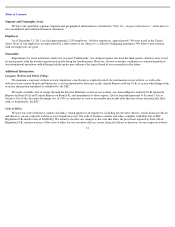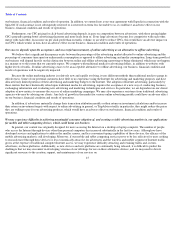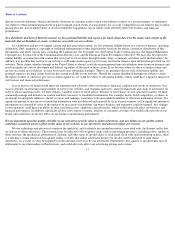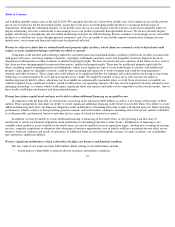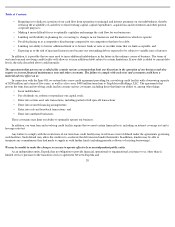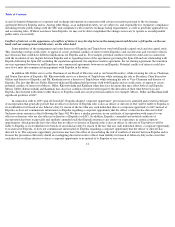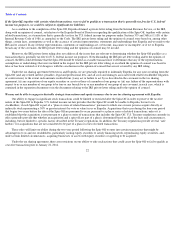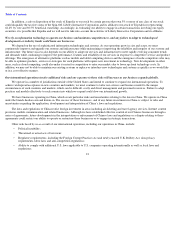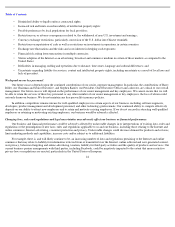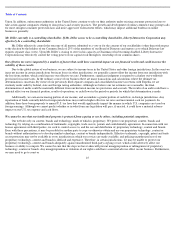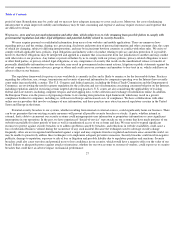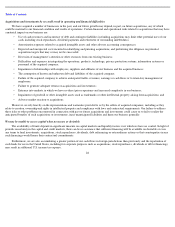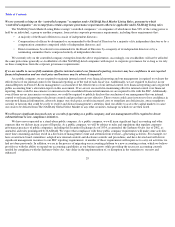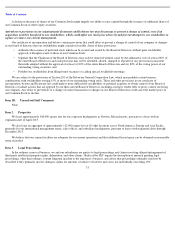TripAdvisor 2011 Annual Report Download - page 26
Download and view the complete annual report
Please find page 26 of the 2011 TripAdvisor annual report below. You can navigate through the pages in the report by either clicking on the pages listed below, or by using the keyword search tool below to find specific information within the annual report.
Table of Contents
If the Spin
-Off, together with certain related transactions, were to fail to qualify as a transaction that is generally tax free for U.S. federal
income tax purposes, we could be subject to significant tax liabilities.
As a condition to the completion of the Spin-Off, Expedia obtained a private letter ruling from the Internal Revenue Service, or the IRS,
along with an opinion of counsel, satisfactory to the Expedia Board of Directors regarding the qualification of the Spin-
Off, together with certain
related transactions, as a transaction that is generally tax free for U.S. federal income tax purposes under Sections 355 and 368(a) (1) (D) of the
Internal Revenue Code of 1986, as amended, or the Code. The IRS private letter ruling and the opinion of counsel were based on, among other
things, certain facts, assumptions as well as the accuracy of certain representations, statements and undertakings that Expedia and we made to the
IRS and to counsel. If any of these representations, statements or undertakings are, or become, inaccurate or incomplete, or if we or Expedia
breach any of the covenants, the IRS private letter ruling and the opinions of counsel may be invalid.
Moreover, the IRS private letter ruling does not address all the issues that are relevant to determining whether the Spin-Off qualifies as a
transaction that is generally tax free for U.S. federal income tax purposes. Notwithstanding the IRS private letter ruling and/or the opinion of
counsel, the IRS could determine that the Spin-Off should be treated as a taxable transaction if it determines that any of the representations,
assumptions or undertakings that were included in the request for the IRS private letter ruling or on which the opinion of counsel was based is
false or has been violated or if it disagrees with the conclusions in the opinion of counsel that are not covered by any IRS ruling.
Under the tax sharing agreement between us and Expedia, we are generally required to indemnify Expedia for any taxes resulting from the
Spin-Off (and any related interest, penalties, legal and professional fees, and all costs and damages associated with related stockholder litigation
or controversies) to the extent such amounts resulted from (i) any act or failure to act by us described in the covenants in the tax sharing
agreement, (ii) any acquisition of our equity securities or assets or those of a member of our group, or (iii) any failure of the representations with
respect to us or any member of our group to be true or any breach by us or any member of our group of any covenant, in each case, which is
contained in the separation documents or in the documents relating to the IRS private letter ruling and/or the opinion of counsel.
We may not be able to engage in desirable strategic transactions and equity issuances due to our tax sharing agreement with Expedia.
Our ability to engage in significant stock transactions could be limited or restricted after the Spin-Off in order to preserve the tax free
nature of the Spin-Off to Expedia. U.S. federal income tax law provides that the Spin-Off would be taxable to Expedia, but not to its
stockholders, if such Spin-Off is part of a “plan or series of related transactions” pursuant to which one or more persons acquire directly or
indirectly stock representing a 50% or greater interest (by vote or value) in us or Expedia. Acquisitions that occur during the four-year period
that begins two years before the date of the Spin-Off are presumed to occur pursuant to a plan or series of related transactions, unless it is
established that the acquisition is not pursuant to a plan or series of transactions that includes the Spin-
Off. U.S. Treasury regulations currently in
effect generally provide that whether an acquisition and a spin-off are part of a plan is determined based on all of the facts and circumstances,
including, but not limited to, specific factors described in the Treasury regulations. In addition, the Treasury regulations provide several “safe
harbors” for acquisitions that are not considered to be part of a plan or series of related transactions.
These rules will limit our ability during the two-year period following the Spin-Off to enter into certain transactions that might be
advantageous to us and our stockholders, particularly issuing equity securities to satisfy financing needs, repurchasing equity securities, and,
under certain limited circumstances, acquiring businesses or assets with equity securities or agreeing to be acquired.
Under the tax sharing agreement, there are restrictions on our ability to take such actions that could cause the Spin-Off to fail to qualify as
a tax free transaction prior to January 21, 2014.
22


